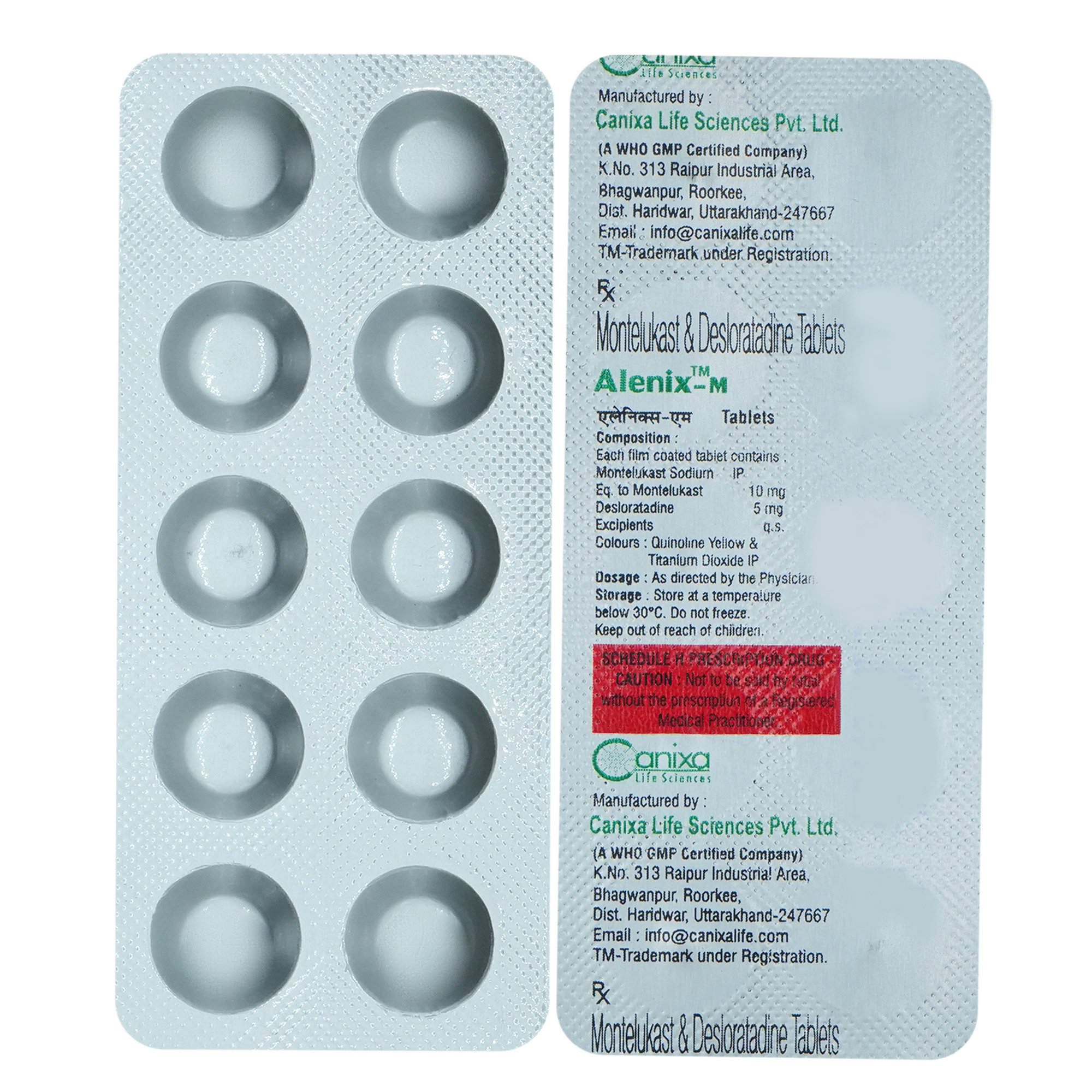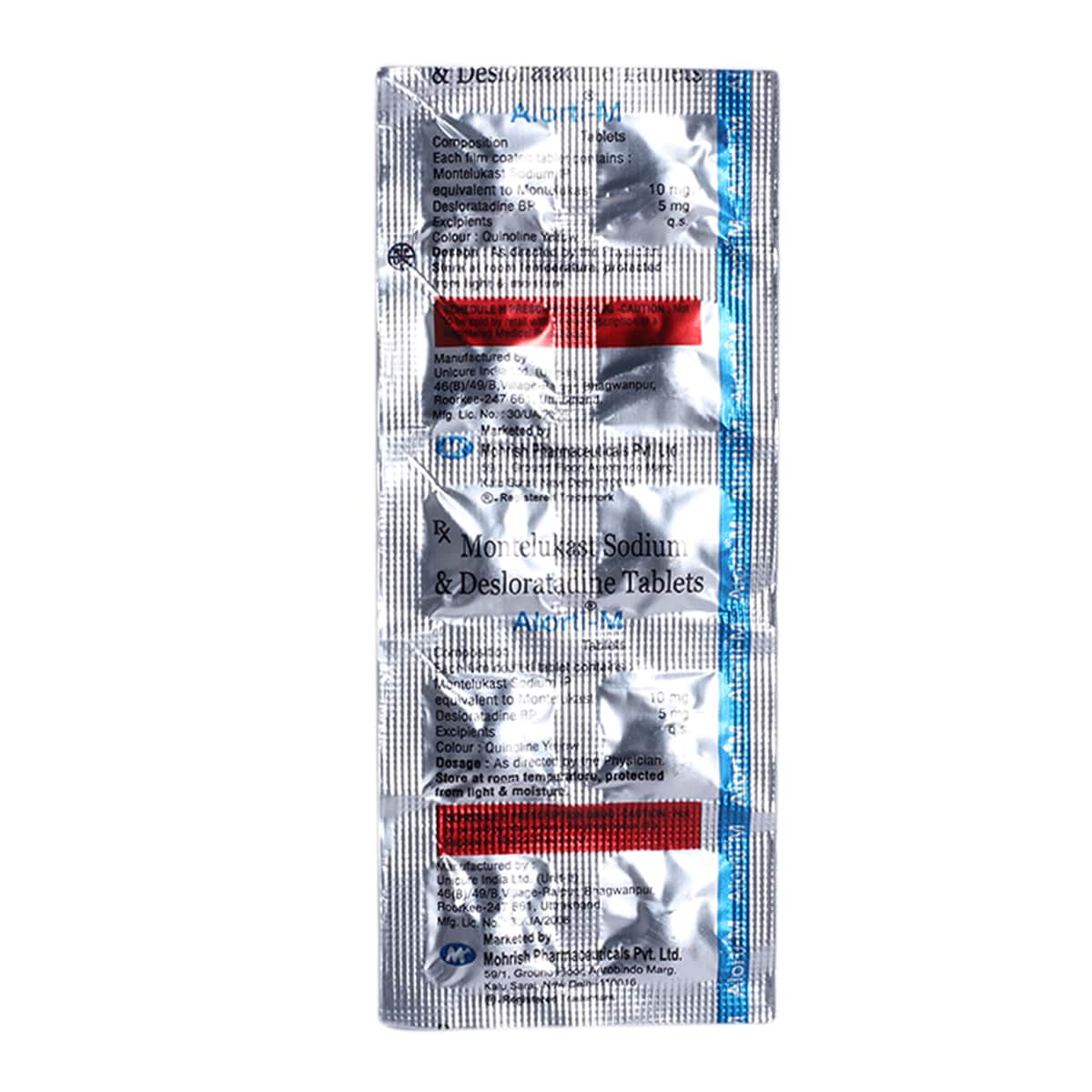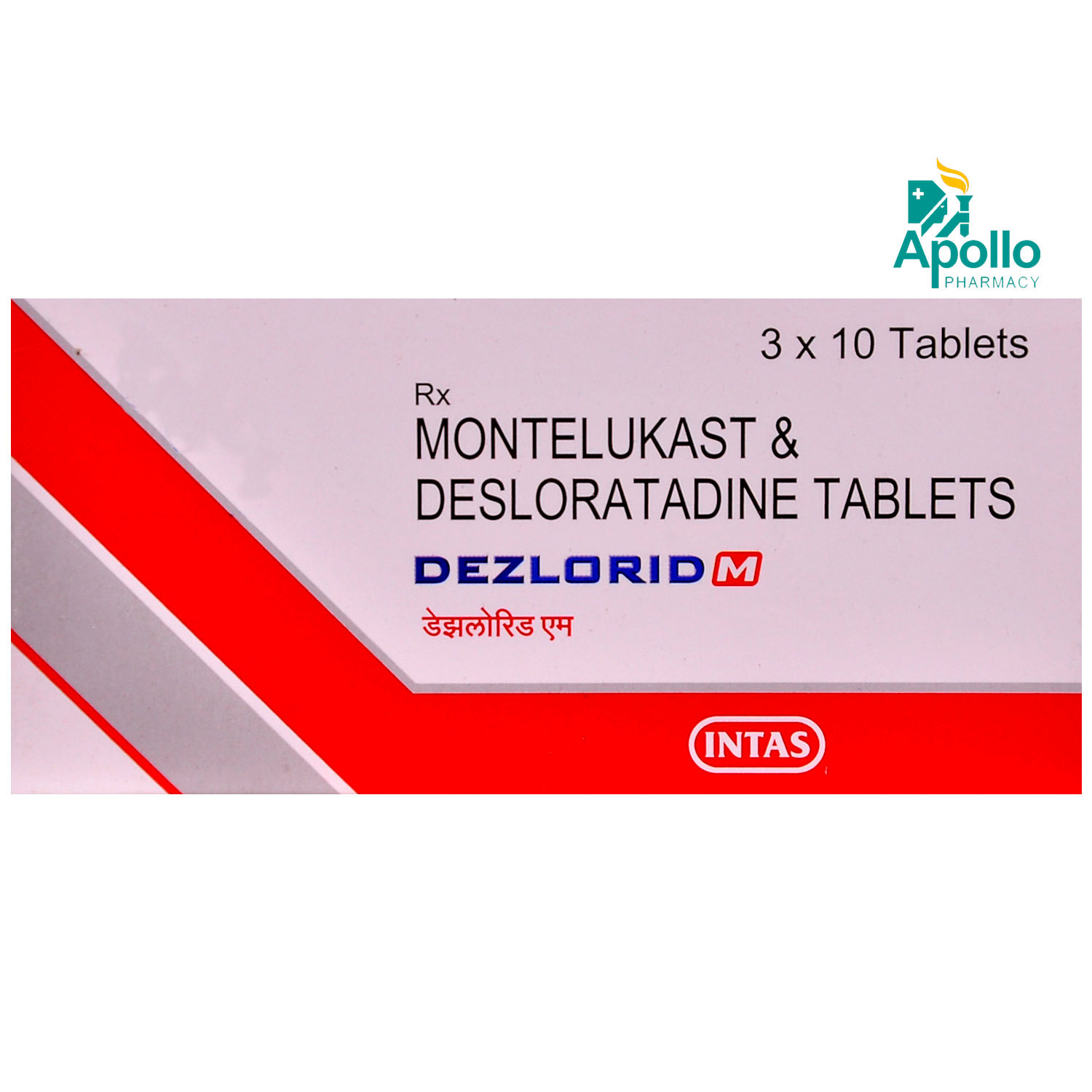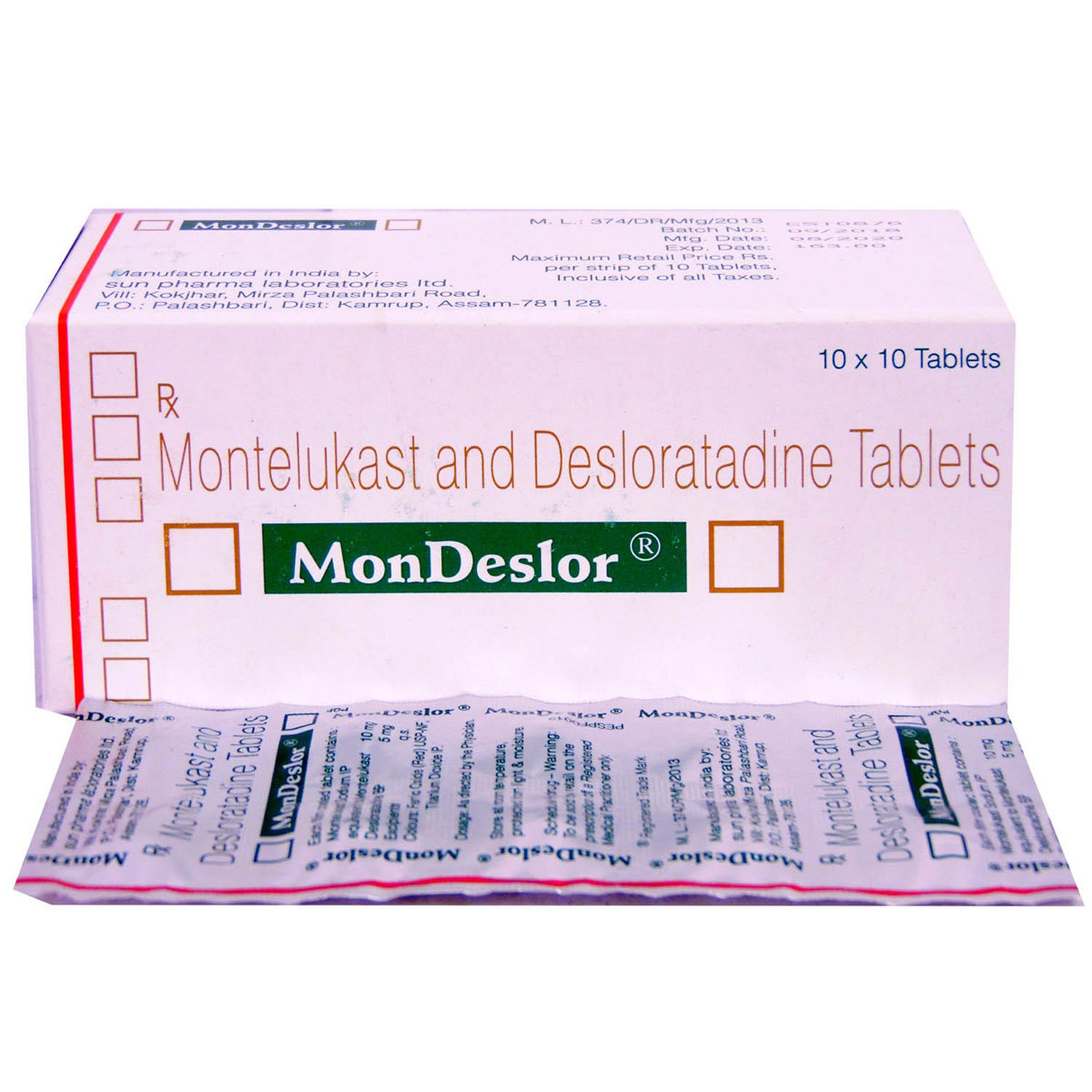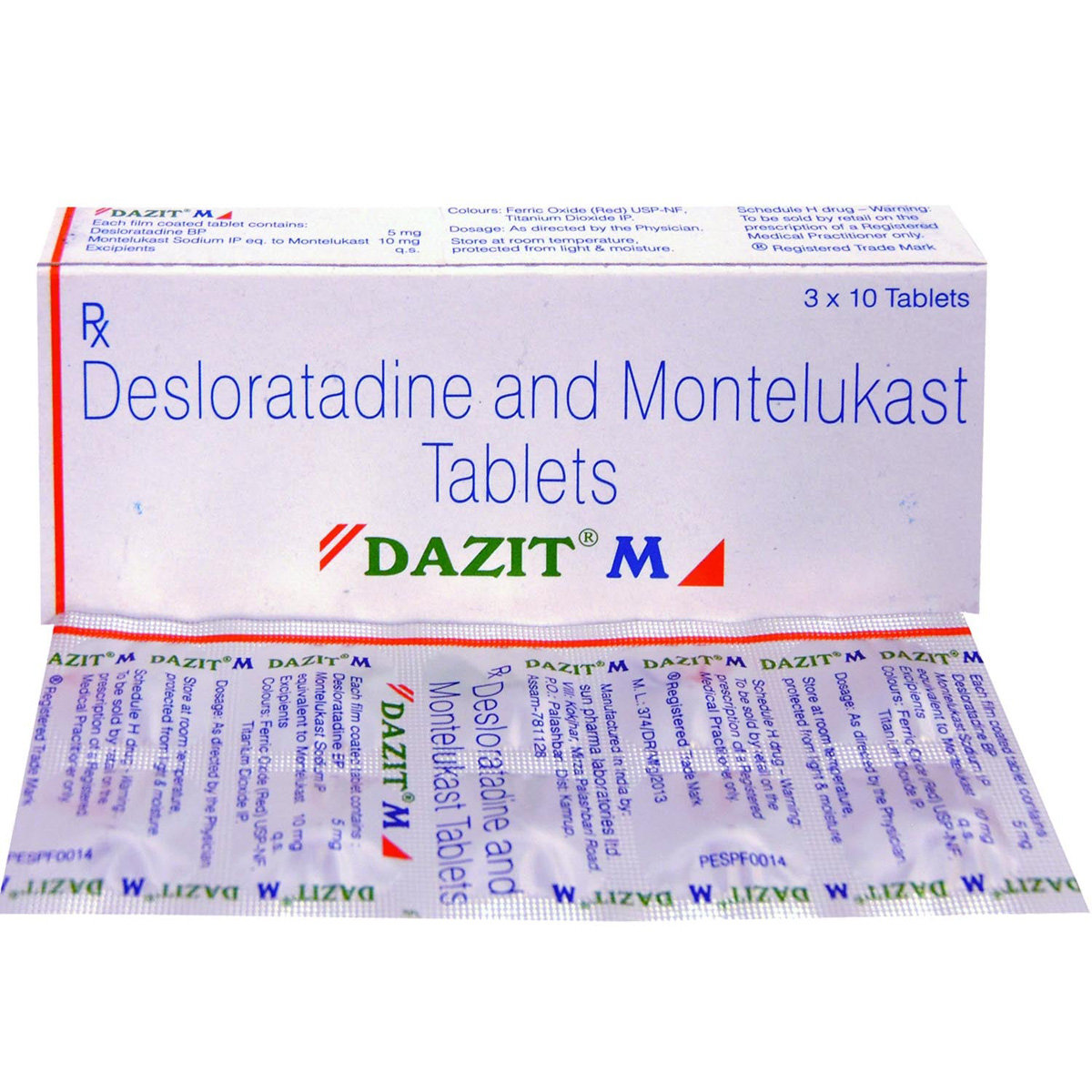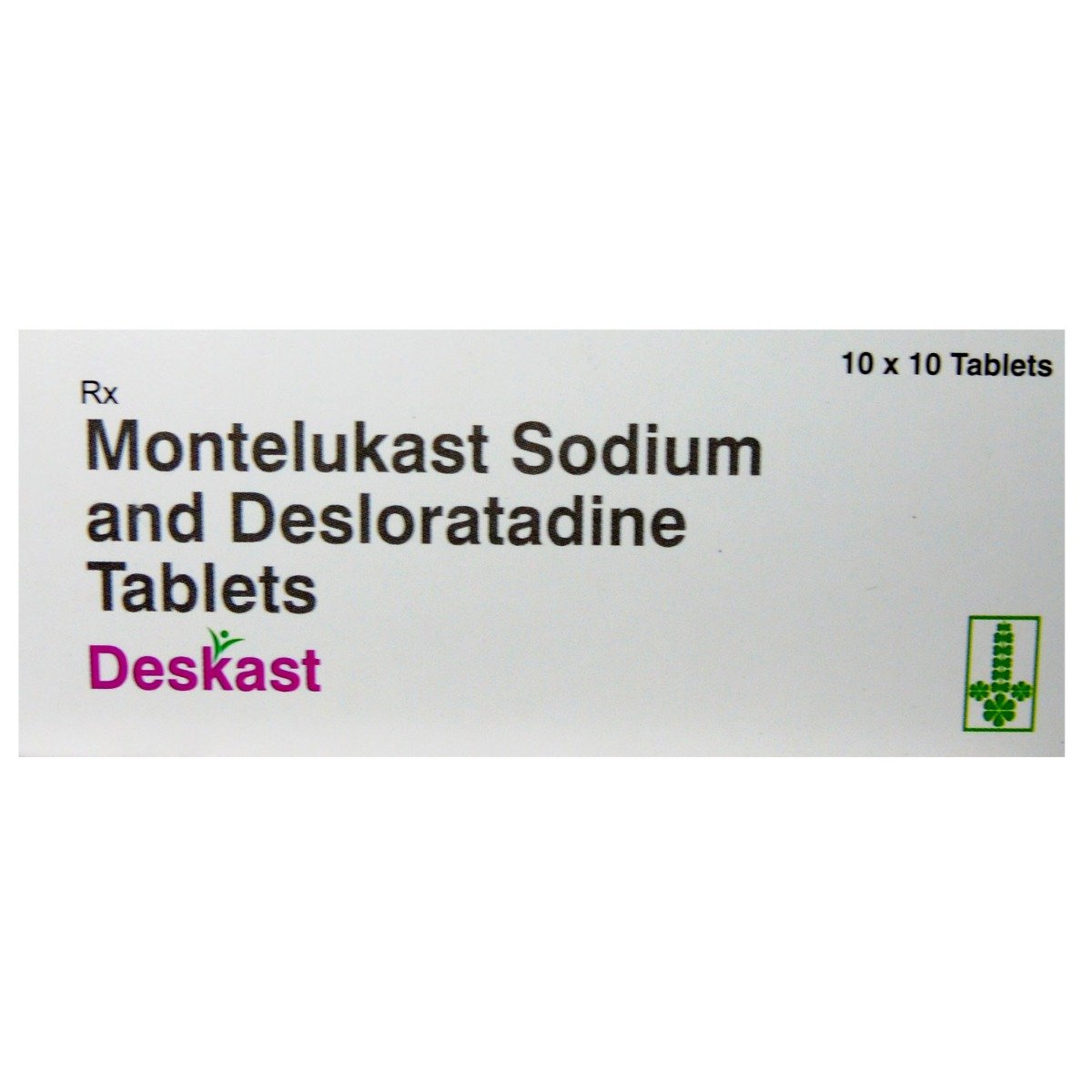Ventidox DL Tablet 10's







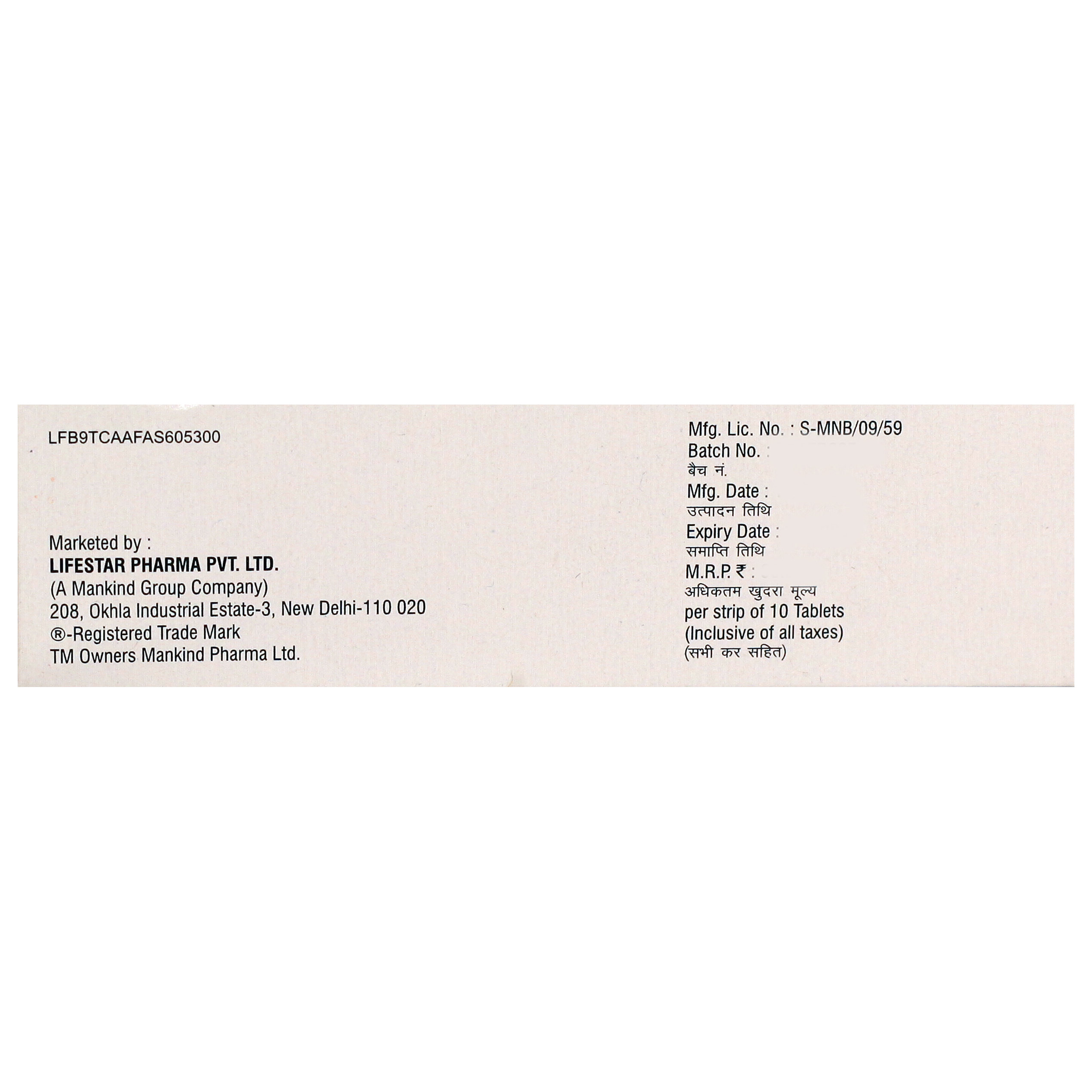
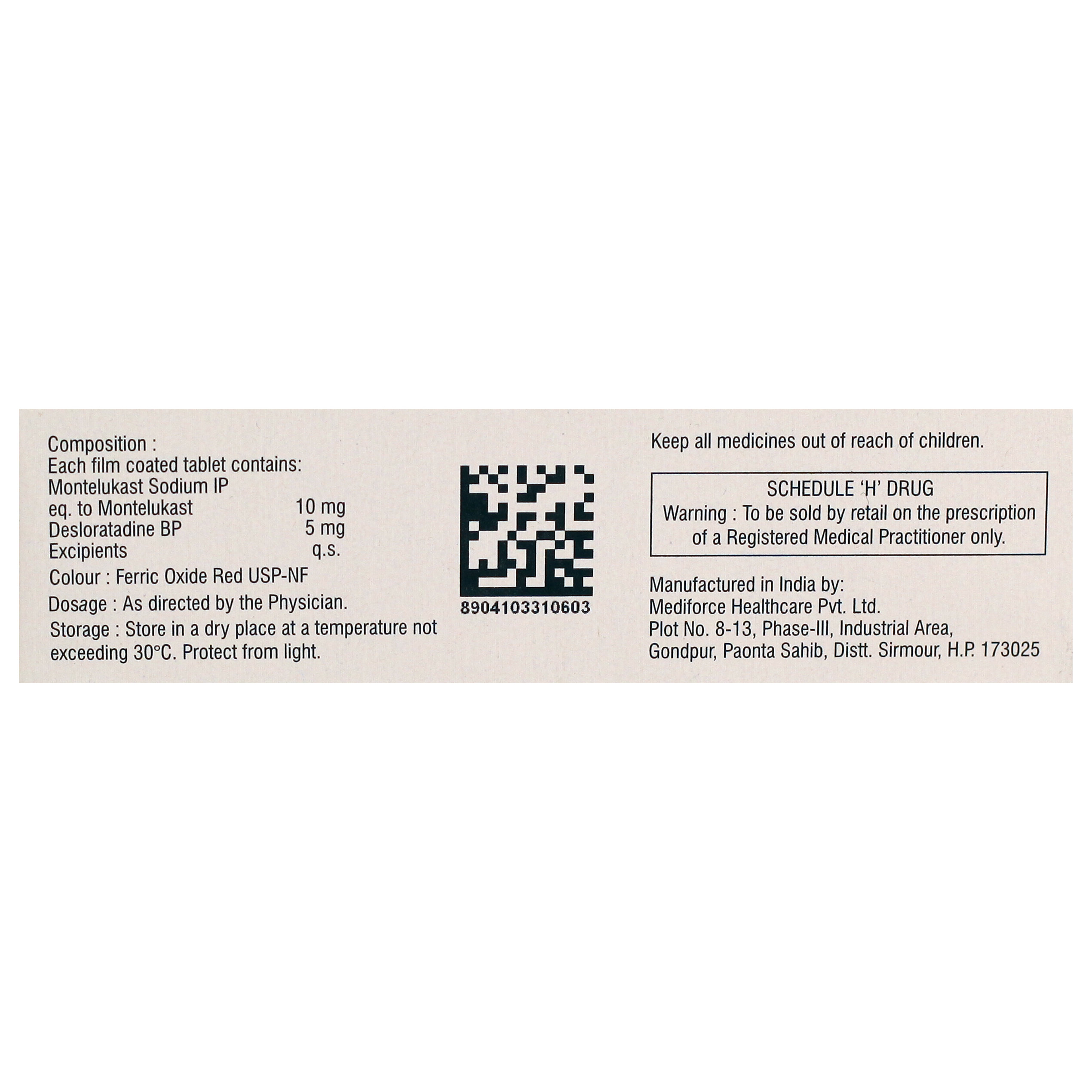
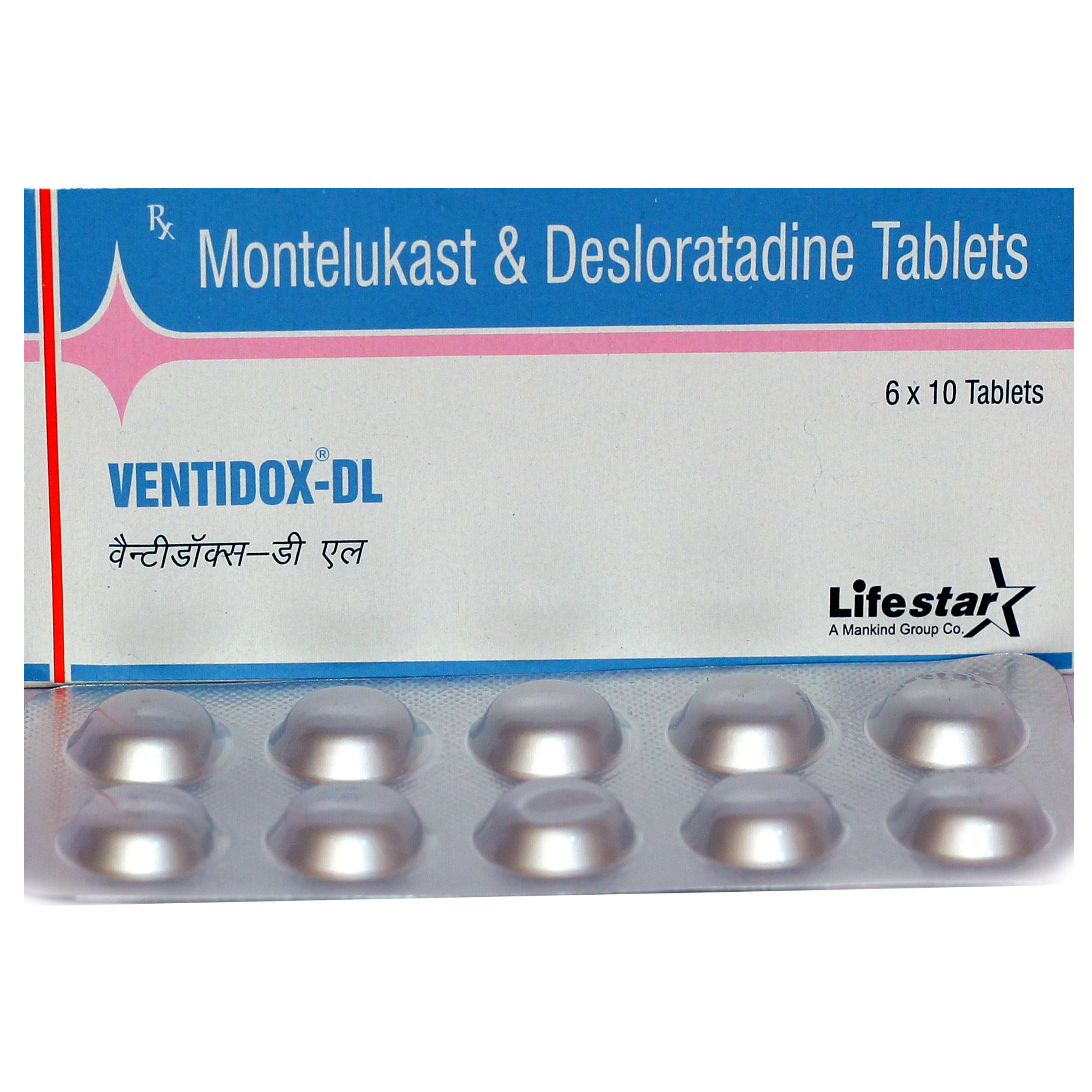
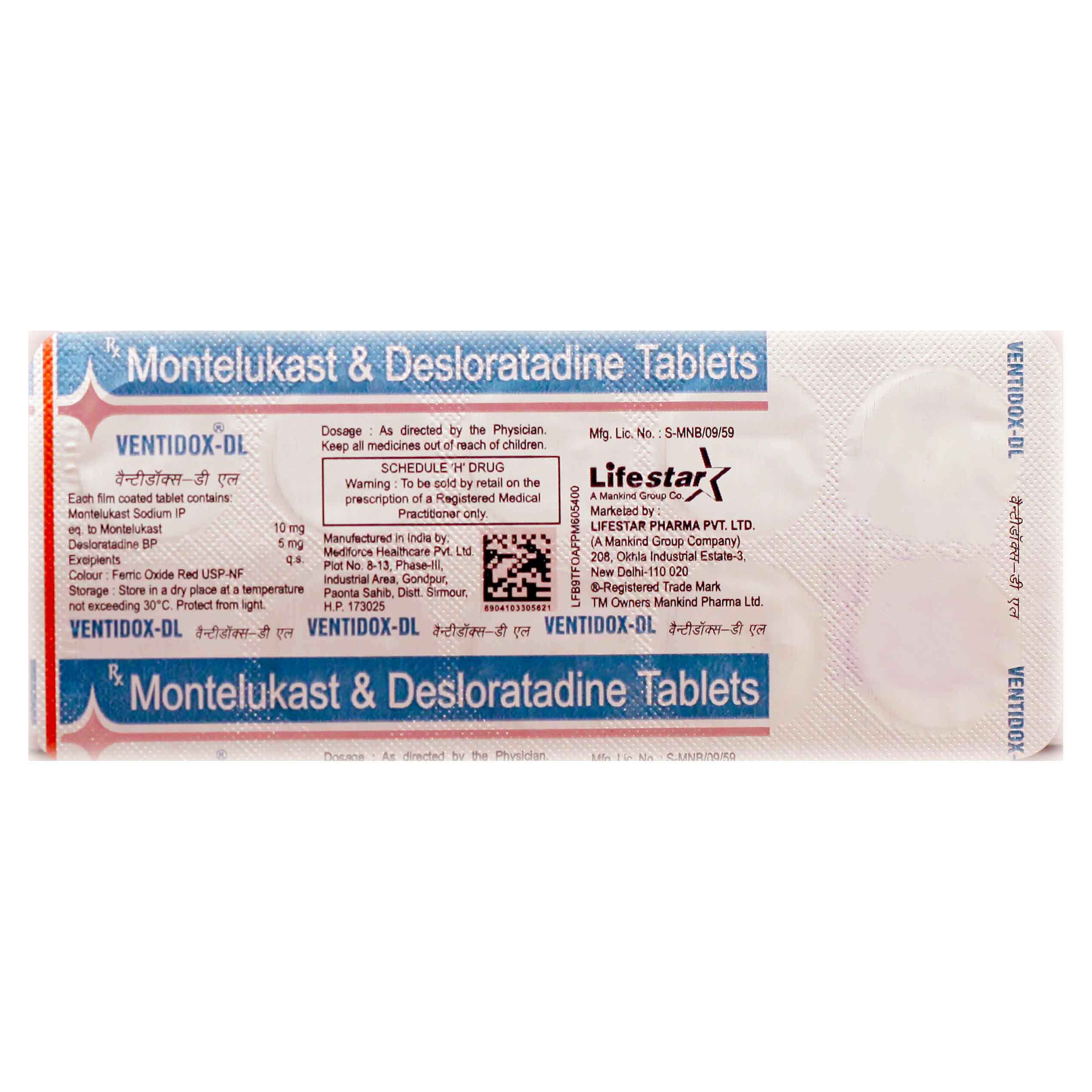
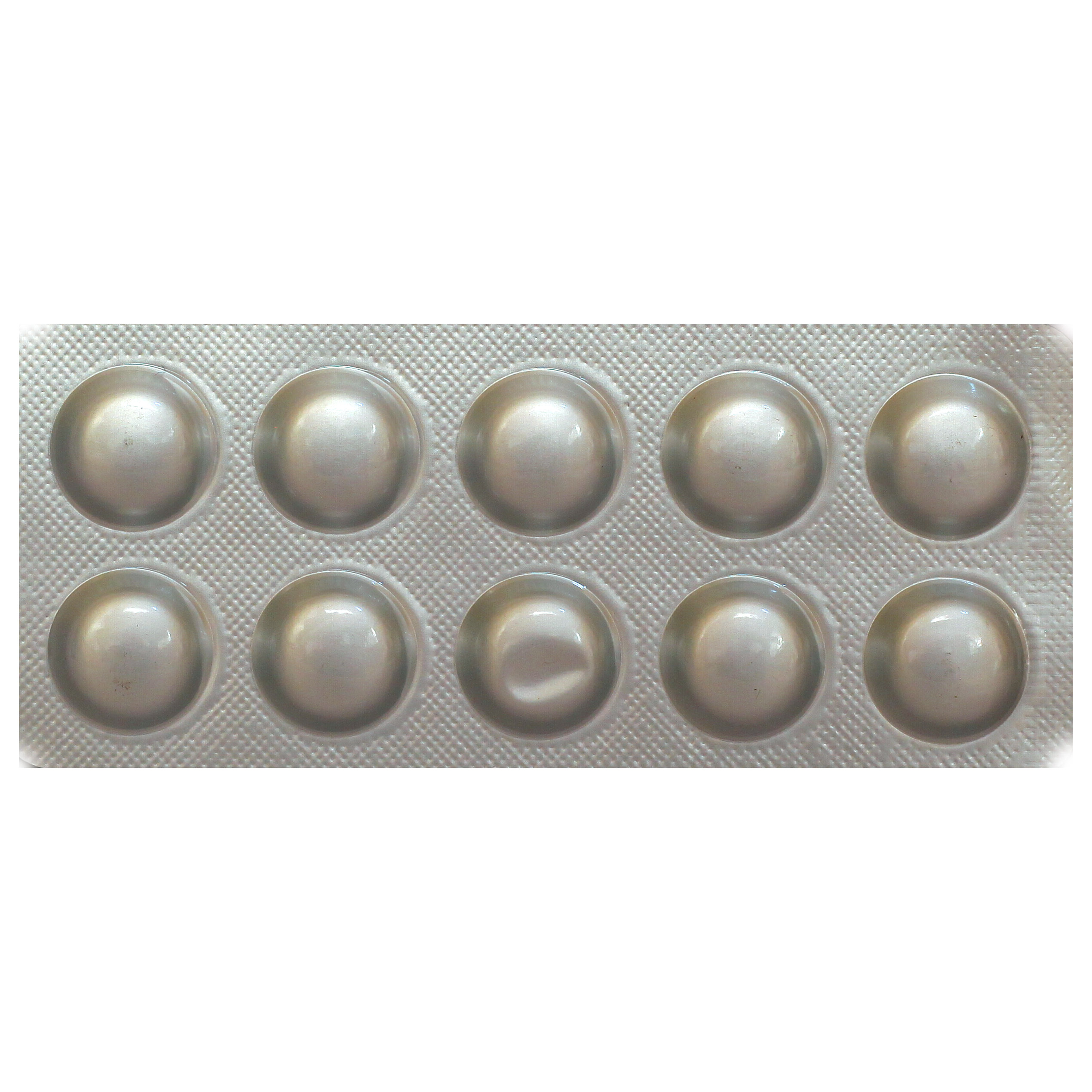
MRP ₹106.5
(Inclusive of all Taxes)
₹16.0 Cashback (15%)
Provide Delivery Location
Online payment accepted
 Prescription drug
Prescription drugWhats That
Composition :
Manufacturer/Marketer :
Consume Type :
Expires on or after :
Return Policy :
About Ventidox DL Tablet
Ventidox DL Tablet belongs to the class of medications ‘antiallergic’ used in the treatment of allergic rhinitis. Allergic rhinitis (hay fever) is an allergic response to certain foods or pollen, pet dander, or other allergens. Allergic condition varies from person to person. It is typically characterized by allergic symptoms such as a runny nose, sneezing, red, watery, itchy, and swollen eyes.
Ventidox DL Tablet is a combination of two medicines: Desloratadine and Montelukast. Desloratadine is an antihistamine and acts by blocking histamine's action (chemicals causing allergic symptoms) and reducing the allergic reaction. It provides quick relief from allergic symptoms. Montelukast is a leukotriene antagonist, which blocks a chemical messenger (leukotriene) and reduces inflammation and swelling in the nose.
You should take this medicine as prescribed by your doctor. The common side-effects of Ventidox DL Tablet are abdominal pain, headache, fatigue, and dry mouth. These side-effects usually go away without any medical treatment. However, if any of these side-effects persist or worsen, consult a doctor immediately.
Do not take Ventidox DL Tablet if you are allergic to Desloratadine, Montelukast, or any other ingredients present in it. Before taking Ventidox DL Tablet , inform your doctor about all the allergies you have, if any. Ventidox DL Tablet is not recommended in patients who have medical or family history of seizures, kidney failure, and phenylketonuria (an inherited disease that causes a build-up of amino acid phenylalanine in the body). Ventidox DL Tablet is not recommended for use in children under 12 years of age. Inform your doctor if you are pregnant or breastfeeding.
Uses of Ventidox DL Tablet
Directions for Use
Key Benefits
Ventidox DL Tablet is a combination of two medicines: Desloratadine and Montelukast. Desloratadine is an antihistamine and acts by blocking histamine's action (chemicals causing allergic symptoms) and reducing the allergic reaction. It provides quick relief from allergic symptoms. Montelukast is a leukotriene antagonist, which blocks a chemical messenger (leukotriene) and reduces inflammation and swelling in the nose. Together, Ventidox DL Tablet improves allergic symptoms such as sneezing, runny nose, coughing, watery eyes, etc.
Storage
- Hydrate your body: Drink enough water to prevent dehydration and headaches.
- Calm Your Mind: Deep breathing and meditation can help you relax and relieve stress.
- Rest and Recharge: Sleep for 7-8 hours to reduce headache triggers.
- Take rest: lie down in a quiet, dark environment.
- Cold or warm compresses can help reduce tension.
- Stay Upright: Maintain good posture to keep symptoms from getting worse.
- To treat headaches naturally, try acupuncture or massage therapy.
- Over-the-counter pain relievers include acetaminophen and ibuprofen.
- Prescription Assistance: Speak with your doctor about more substantial drug alternatives.
- Severe Headaches: Seek emergency medical assistance for sudden, severe headaches.
- Frequent Headaches: If you get reoccurring headaches, consult your doctor.
- Headaches with Symptoms: Seek medical attention if your headaches include fever, disorientation, or weakness.
- Inform your doctor immediately if you experience a fever after starting a new medication.
- Your doctor may adjust your medication regimen or dosage as needed to minimize fever symptoms.
- Monitor your body temperature to monitor fever progression.
- Drink plenty of fluids, such as water or electrolyte-rich beverages, to help your body regulate temperature.
- Get plenty of rest and engage in relaxation techniques, such as deep breathing or meditation, to help manage fever symptoms.
- Under the guidance of your doctor, consider taking medication, such as acetaminophen or ibuprofen, to help reduce fever.
- If your fever is extremely high (over 103°F), or if you experience severe symptoms such as confusion, seizures, or difficulty breathing, seek immediate medical attention.
- Manage stress by practising deep breathing, yoga or meditation.
- Get enough sleep. Maintain a regular sleep cycle.
- Exercise regularly. Try physical activities like walking, running, or dancing.
- Limit stimulants like tea, coffee and alcohol.
- Identify triggers and try managing them.
- Take a break by scheduling time for yourself.
- Try creative activities like writing, dancing or painting as it helps release tension.
- Inform your doctor about the symptoms you're experiencing due to medication.
- Your doctor may adjust your treatment plan, which could include changing your medication, adding new medications, or offering advice on managing your symptoms.
- Practice good hygiene, including frequent handwashing, avoiding close contact with others, and avoiding sharing utensils or personal items.
- Stay hydrated by drinking plenty of fluids to help loosen and clear mucus from your nose, throat, and airways.
- Get plenty of rest and engage in stress-reducing activities to help your body recover. If your symptoms don't subside or worsen, consult your doctor for further guidance.
- Tell your doctor about the cough symptoms you're experiencing, which may be triggered by your medication.
- Your doctor may adjust your treatment plan by changing your medication, adding new medications, or providing guidance on managing your cough symptoms.
- Practice good hygiene, including frequent handwashing, avoiding close contact with others, and avoiding sharing utensils or personal items.
- Stay hydrated by drinking plenty of fluids, such as water, tea, or soup, to help thin out mucus and soothe your throat.
- Get plenty of rest and engage in stress-reducing activities to help your body recover. If your cough persists or worsens, consult your doctor for further guidance.
- Inform your doctor about dizziness symptoms. They may adjust your medication regimen or prescribe additional medications to manage symptoms.
- Follow your doctor's instructions for taking medication, and take it at the same time every day to minimize dizziness.
- When standing up, do so slowly and carefully to avoid sudden dizziness.
- Avoid making sudden movements, such as turning or bending quickly, which can exacerbate dizziness.
- Drink plenty of water throughout the day to stay hydrated and help alleviate dizziness symptoms.
- If you're feeling dizzy, sit or lie down and rest until the dizziness passes.
- Track when dizziness occurs and any factors that may trigger it, and share this information with your doctor to help manage symptoms.
Drug Warnings
If you notice any behavioral changes while taking Ventidox DL Tablet , inform your doctor immediately. If you are supposed to undergo skin testing, the doctor might advise you to stop taking Ventidox DL Tablet 72 hours before the test as it decreases response to skin prick test. Do not stop taking Ventidox DL Tablet abruptly even if you feel better, as it may cause withdrawal symptoms such as itching, burning sensations, or runny nose.
Drug-Drug Interactions
Drug-Drug Interactions
Login/Sign Up
Co-administration of Ventidox DL Tablet with Isocarboxazid can increase the risk of CNS depression.
How to manage the interaction:
Taking Ventidox DL Tablet with Isocarboxazid together can possibly result in an interaction, but it can be taken if a doctor has advised it. Do not stop using any medications without talking to a doctor.
Co-administration of Ivacaftor and Ventidox DL Tablet can increase the levels of Ventidox DL Tablet.
How to manage the interaction:
Co-administration of Ventidox DL Tablet with Ivacaftor can possibly result in an interaction, but it can be taken if doctor has advised it. Do not stop using any medications without talking to a doctor.
Co-administration of Ventidox DL Tablet with Tranylcypromine may increase the risk or severity of CNS depression (decreased heart rate, decreased rate of breathing, loss of consciousness).
How to manage the interaction:
Although there is an interaction between Ventidox DL Tablet with tranylcypromine, but it can be taken if a doctor has advised it. However, if you experience any unusual symptoms contact your doctor immediately. Do not discontinue any medications without consulting a doctor.
Coadministration of Rifapentine with Ventidox DL Tablet may reduce the blood levels and effects of Ventidox DL Tablet. This can lead to low treatment outcomes.
How to manage the interaction:
Taking Rifapentine with Ventidox DL Tablet together can possibly result in an interaction, it can be taken if your doctor has advised it. If you experience increased side effects such as headache, fever, sore throat, cough, abdominal pain, diarrhea, earaches, runny nose, or behavior and mood changes consult a doctor. Do not discontinue any medications without consulting a doctor.
Coadministration of Miconazole with Ventidox DL Tablet may increase the blood levels and effects of Ventidox DL Tablet. This increases the risk or severity of side effects.
How to manage the interaction:
Although there is a possible interaction between miconazole and Ventidox DL Tablet, you can take these medicines together if prescribed by your doctor. However, if you experience any symptoms such as fever, sore throat, cough, stomach pain, diarrhea, earache, runny nose, or uncommon, depression, confusion, difficulty concentrating, anxiety, hallucinations, irritability. memory impairment, restlessness, sleep walking, Consult a doctor immediately. Do not stop using medications without a doctor's advice.
Coadministration of Ventidox DL Tablet and Phenytoin may reduce the blood levels and effects of Ventidox DL Tablet. This can lead to low treatment outcomes.
How to manage the interaction:
Taking Ventidox DL Tablet and Phenytoin may interact with one another, but they can be taken together if your doctor has prescribed them. However, if you experience signs such as headache, fever, sore throat, cough, abdominal pain, diarrhoea, earache, runny nose, or behaviour and mood changes, consult a doctor immediately. Do not discontinue any medications without consulting a doctor.
Coadministration of Ventidox DL Tablet and primidone can reduce the levels and effects of Ventidox DL Tablet.
How to manage the interaction:
Taking Ventidox DL Tablet and Primidone together can possibly result in an interaction, it can be taken if prescribed by a doctor. However, if you experience any unusual symptoms, contact a doctor immediately. Do not discontinue any medications without consulting a doctor.
Coadministration of Ventidox DL Tablet and rifabutin can reduce the levels and effects of Rifabutin. This can lead to low treatment outcomes.
How to manage the interaction:
Taking Ventidox DL Tablet and rifabutin together can possibly result in an interaction, it can be taken if your doctor has advised it. However, if you experience increased side effects such as headache, fever, sore throat, cough, abdominal pain, diarrhea, earache, runny nose, or behavior and mood changes consult a doctor. Do not discontinue any medications without consulting a doctor.
Drug-Food Interactions
Drug-Food Interactions
Login/Sign Up
Diet & Lifestyle Advise
- Stay hydrated as it is vital for those with a cough or cold. Drinking liquids at room temperature can alleviate runny nose and sneezing.
- Avoid stress as the immune system is affected by stress and raises the risk of being sick. An individual can exercise regularly, meditate, do deep breathing, and try progressive muscle relaxation techniques to relieve stress.
- Avoid contact with known allergens (allergy-causing agents) such as pollen, dust, etc., and also certain food items are known to cause allergies to you.
- Maintain personal hygiene and keep your surroundings clean.
Side Effects of Ventidox DL Tablet
- Abdominal pain
- Headache
- Fatigue
- Dry mouth
- Diarrhea
- Dizziness
- Drowsiness
- Nausea
- Vomition
- Fatigue
- Irritability
Habit Forming
Therapeutic Class
All Substitutes & Brand Comparisons
RX
Desmont Tablet 10's
Xemex Life Sciences
₹101.5
(₹9.14 per unit)
4% CHEAPERRX
Avertich-M Tablet 10's
Amwill Healthcare Pvt Ltd
₹107.5
(₹9.68 per unit)
RX
Out of StockBestmont-DM Tablet
₹110
(₹9.9 per unit)
3% COSTLIER
Product Substitutes
Drug-Diseases Interactions
Drug-Diseases Interactions
Login/Sign Up
FAQs
Ventidox DL Tablet is a combination of two medicines: Desloratadine and Montelukast. Desloratadine is an antihistamine and acts by blocking the action of histamines (chemical substances) that cause allergic symptoms. Montelukast is a leukotriene antagonist, which blocks a chemical messenger (leukotriene) and reduces inflammation and swelling in the nose. Together, Ventidox DL Tablet It provides quick relief from allergic symptoms such as sneezing, runny nose, coughing, watery eyes, etc.
Ventidox DL Tablet can be safely taken daily until your allergic symptoms subside and as long as your doctor has advised you to take it.
The common side-effects of Ventidox DL Tablet are abdominal pain, headache, fatigue, and dry mouth. These side-effects are usually mild and go away without any treatment.
Ventidox DL Tablet can be safely used in patients with diabetes. However, always consult your doctor before taking Ventidox DL Tablet to discuss the possible risks associated with this medicine.
Ventidox DL Tablet can improve symptoms in patients with seasonal allergic asthma. However, always consult your doctor before taking Ventidox DL Tablet to discuss the possible risks associated with this medicine.
Drug-Drug Interactions Checker List
- PHENOBARBITAL
- PHENYTOIN
- FLUOXETINE
- CIMETIDINE
- KETOCONAZOLE
- AZITHROMYCIN
- ERYTHROMYCIN
- RIFAMPICIN
- GEMFIBROZIL
- ASPIRIN
Special Advise
- Stop taking Ventidox DL Tablet and inform your doctor or the person before undergoing any tests.
Disease/Condition Glossary
Allergic rhinitis: It is also called hay fever. It occurs when the immune system responds to foreign elements that are typically not harmful to your body. These foreign elements are known as ‘allergens’ and examples may include pollen, pet dander, and dust mites, etc. Symptoms include itching, watery eyes, swelling around the eyes, runny nose, and sneezing. It is usually identified by performing a skin prick test and allergen-specific immunoglobulin (IgE) antibody test.

Have a query?
Buy best Anti Allergic Drugs products by
Cipla Ltd
Micro Labs Ltd
Sun Pharmaceutical Industries Ltd
Alkem Laboratories Ltd
Mankind Pharma Pvt Ltd
Dr Reddy's Laboratories Ltd
Lupin Ltd
Leeford Healthcare Ltd
Abbott India Ltd
Intas Pharmaceuticals Ltd
Glenmark Pharmaceuticals Ltd
Morepen Laboratories Ltd
Alembic Pharmaceuticals Ltd
Aristo Pharmaceuticals Pvt Ltd
East West Pharma India Pvt Ltd
Hetero Drugs Ltd
Torrent Pharmaceuticals Ltd
Systopic Laboratories Pvt Ltd
Zydus Cadila
Ajanta Pharma Ltd
Canixa Life Sciences Pvt Ltd
FDC Ltd
Macleods Pharmaceuticals Ltd
Zuventus Healthcare Ltd
Hegde & Hegde Pharmaceutica Llp
Kivi Labs Ltd
Koye Pharmaceuticals Pvt Ltd
Medishri Healthcare Pvt Ltd
Rapross Pharmaceuticals Pvt Ltd
Sanofi India Ltd
Unison Pharmaceuticals Pvt Ltd
Wockhardt Ltd
Biochem Pharmaceutical Industries Ltd
Elder Pharmaceuticals Ltd
Indoco Remedies Ltd
Fourrts India Laboratories Pvt Ltd
Zydus Healthcare Ltd
Amwill Healthcare Pvt Ltd
Bayer Pharmaceuticals Pvt Ltd
Corona Remedies Pvt Ltd
Indiabulls Pharmaceuticals Pvt Ltd
Ipca Laboratories Ltd
Klm Laboratories Pvt Ltd
Olcare Laboratories Pvt Ltd
Talent India Pvt Ltd
Zee Laboratories Ltd
Auspharma Pvt Ltd
Biocute Life Care
Cadila Healthcare Ltd
Dolvis Bio Pharma Pvt Ltd
Entod Pharmaceuticals Ltd
Indchemie Health Specialities Pvt Ltd
Levin Life Sciences Pvt Ltd
Med Manor Organics Pvt Ltd
Pristine Pearl Pharma Pvt Ltd
Rockmed Pharma Pvt Ltd
Troikaa Pharmaceuticals Ltd
Uniza Healthcare Llp
Cadila Pharmaceuticals Ltd
Capital Pharma
Cnx Health Care Pvt Ltd
Eumedica Pharamceuticals
Galcare Pharmaceuticals Pvt Ltd
GlaxoSmithKline Pharmaceuticals Ltd
Knoll Healthcare Pvt Ltd
Medgen Drugs And Laboratories Pvt Ltd
Oaknet Healthcare Pvt Ltd
Seagull Pharmaceutical Pvt Ltd
Skn Organics Pvt Ltd
Unipark Biotech Pvt Ltd
Akumentis Healthcare Ltd
Apex Laboratories Pvt Ltd
Atopic laboratories Pvt Ltd
Aurz Pharmaceutical Pvt Ltd
Biophar Lifesciences Pvt Ltd
Delcure Life Sciences Ltd
Eris Life Sciences Ltd
Gladstone Pharma India Pvt Ltd
Heal (India) Laboratories Pvt Ltd
Inex Medicaments Pvt Ltd
Keimed Pvt Ltd
Kepler Healthcare Pvt Ltd
Lividus Pharmaceuticals Pvt Ltd
Monichem Healthcare Pvt Ltd
Nova Indus Pharmaceuticals
Psychotropics India Ltd
RPG Life Sciences Ltd
Rnd Laboratories Pvt Ltd
SMG Global Pharma
TTK Healthcare Ltd
Vasu Organics Pvt Ltd
Votary Laboratories (India) Ltd
Yaher Pharma
Yuventis Pharmaceuticals
Acclimate Life Sciences
Bioceutics Inc
Biochemix Health Care Pvt Ltd
Brinton Pharmaceuticals Ltd
Chlorophyll Pharmaceuticals
DR Johns Lab Pharma Pvt Ltd
Alcohol
Safe if prescribed
Alcohol consumption may worsen your health condition and also interfere with the activity of Ventidox DL Tablet . So, do not consume alcohol while taking Ventidox DL Tablet .
Pregnancy
Consult your doctor
Ventidox DL Tablet is a category C medicine. It may cause toxic effects to the fetus. So, it should be used in pregnant women only if needed by doing a benefit/risk assessment.
Breast Feeding
Consult your doctor
Ventidox DL Tablet can be safely used in breastfeeding mothers when prescribed.
Driving
Safe if prescribed
Ventidox DL Tablet may cause drowsiness. So, do not drive or operate heavy machinery if you feel sleepy.
Liver
Consult your doctor
Ventidox DL Tablet should be used with caution in patients with liver diseases. The dose may have to be adjusted by your doctor.
Kidney
Consult your doctor
Ventidox DL Tablet should be used with caution in patients with kidney diseases. The dose may have to be adjusted by your doctor.
Children
Safe if prescribed
Ventidox DL Tablet is not recommended for use in children under 12 years of age.




